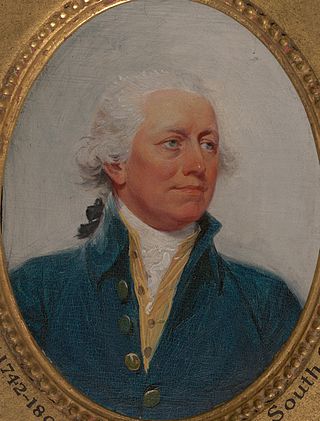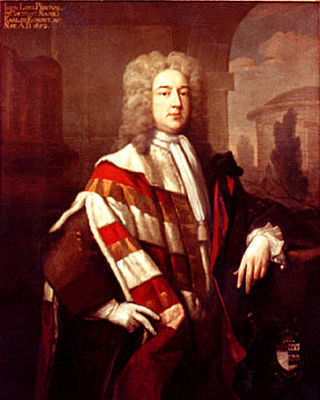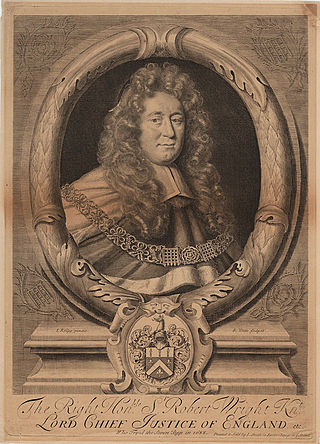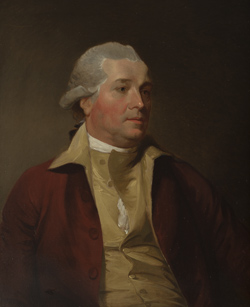"Answers to queries sent by the Lords of Trade [in] 1761, 1762 / Governor James Wright". Southeastern Native American Documents, 1730-1842. Digital Library of Georgia. Retrieved 13 February 2018.
Related Research Articles
James, Jimmy, or Jim Wright may refer to:
Robert Johnson (1682–1735) served as the governor of South Carolina from 1717 to 1719 and from 1729 to 1735. Johnson ordered Colonel William Rhett to engage the notorious pirate Stede Bonnet's sloops in the Battle of Cape Fear River with the Charleston Militia on sea in 1718. His grandson was South Carolina Senator Ralph Izard.

Earl of Romney is a title that has been created twice.

The Province of Georgia was one of the Southern Colonies in colonial-era British America. In 1775 it was the last of the Thirteen Colonies to support the American Revolution.

Ralph Izard was an American politician who served as president pro tempore of the United States Senate in 1794.

John Houstoun was an American lawyer and statesman from Savannah, Georgia. He was one of the original Sons of Liberty and also a delegate for Georgia in the Second Continental Congress in 1775. He was the Governor of Georgia, in 1778, and again in 1784–1785.

John Milledge was an American politician. He fought in the American Revolution and later served as United States Representative, 26th Governor of Georgia, and United States Senator. Milledge was a founder of Athens, Georgia, and the University of Georgia. From January to May 1809, Milledge served briefly as President pro tempore of the United States Senate.
Admiral Sir James Wallace was an officer of the Royal Navy. He served for a time as a colonial governor.

John Perceval, 1st Earl of Egmont, PC, FRS, known as Sir John Perceval, Bt, from 1691 to 1715, as The Lord Perceval from 1715 to 1722 and as The Viscount Perceval from 1722 to 1733, was an Anglo-Irish politician.

Sir Robert Burdett, 3rd Baronet DL was an English baronet and Tory politician.

Charles Craven was the son of Sir William Craven and Margaret Clapham. He held the office of Governor of Carolina between 1711 and 1716.

Sir Robert Wright was an English judge and Chief Justice of the King's Bench 1687–89.
Peers of the Realm have been associated with Australia since early in its history as a British settlement. Many peers served as governors of the Australian colonies, and in the days when the practice of appointing British governors-general was current, the great majority were peers.
The Province of Georgia was a significant battleground in the American Revolution. Its population was at first divided about exactly how to respond to revolutionary activities and heightened tensions in other provinces. Georgia was the only colony not present in the First Continental Congress in 1774. When violence broke out in 1775, radical Patriots took control of the provincial government, and drove many Loyalists out of the province. Georgia subsequently took part to the Second Continental Congress with the other colonies. In 1776 and 1778, Georgia served as the staging ground for several important raids into British-controlled Florida. The British army captured Savannah in 1778, and the American and French forces failed to recapture the city during the Siege of Savannah in 1779. Georgia remained under British control until their evacuation from Savannah in 1782.

John Temple was the first British consul-general to the United States and the first British diplomat to have been born in what later became the United States. He was sometimes known as Sir John Temple, 8th Baronet.
The Trustees for the Establishment of the Colony of Georgia in America, or simply the Georgia Trustees, was a body organized by James Edward Oglethorpe and associates following parliamentary investigations into prison conditions in Britain. After being granted a royal charter in 1732, Oglethorpe led the first group of colonists to the new colony, arriving there in February, 1733. The trustees governed Georgia, one of the Thirteen Colonies, from its founding until 1752, a period known as Trustee Georgia.

The attorney general of South Carolina is the state's chief legal officer and prosecutor.
Thomas Rugge was a diarist and later compiler of 'Mercurius Politicus Redivivus'. The "Diurnall" of Thomas Rugge, which is preserved in the British Museum, corroborates Pepys in many ways.

Robert Wright (1666 – 12 October 1739) was an English judge and jurist. He was the son of Sir Robert Wright, Chief Justice of the King's Bench (1687–1689) who died in Newgate Prison following the Glorious Revolution. In the same year Robert was called to the bar at Middle Temple and became a judge. Robert took the role of Judge of the Common Pleas in the North East of England and married widowed land-heiress Alicea Pitt (née Johnson) (d.1723), daughter of John Johnson of Sedgefield and settled in Sedgefield before returning to London following the Hanoverian succession in 1715.
References
- ↑ "The register of admissions to Gray's inn, 1521-1889, together with the register of marriages in Gray's inn chapel, 1695-1754 : Gray's Inn. cn : Free Download, Borrow, and Streaming". Internet Archive. 1889. Retrieved 27 August 2020.
Aug. 14. JAMES WRIGHT, of Charlestown, in the province of South Carolina, in America, [gent.
- ↑ Russell, David Lee (1 January 2006). Oglethorpe and Colonial Georgia: A History, 1733-1783. McFarland. ISBN 978-0-7864-2233-3.
- ↑ Deaton, Stan. "James Wright (1716-1785)". New Georgia Encyclopedia. Retrieved 14 May 2016.
- ↑ ""My Zeal for the Real Happiness of Both Great Britain and the Colonies": The Conflicting Imperial Career of Sir James Wright by Robert G. Brooking".
On the inside frontmatter page of volume 1 of the William Henry Lyttelton Letterbook at the Clements Library, like in the leafs that come before the text, there appears a list of several addressees, including Among them is "To James Wright at the House of Wm. Rugg Esqr. Conduit Street."
- ↑ Marriage Settlement. This record is held by Huntingdonshire Archives. Reference: 1832/24. Title: Marriage Settlement. Description: 1. John Rugg, Stirtloe, Buckden, gent. & Elizabeth, wf. 2. Robert Wright, Sedgfeild, Bishoprick of Durham Esq.& Rev.John Skelton, Archdeacon of Bedford. Marriage of 1. to Eliz.sister of Robert Wright & portion 1 to 2. 1½a woodground in Stirtloe having South field to East & other lands of John Rugg to north, formerly of Israel Raynolds, lately purchased by 1. of Dickmans. In trust. Date: 30 Jul/1 Aug. 1692 – The National Archives. 30 July – 1 August 1692.
- ↑ Burke, John (1835). A Genealogical and Heraldic History of the Commoners of Great Britain and Ireland, Enjoying Territorial Possessions Or High Official Rank: But Univested with Heritable Honours. H. Colburn.
- ↑ "Stemmata Chicheleana; or, A genealogical account of some of the families derived from Thomas Chichele, of Higham-Ferrers in the county of Northampton; all of whose descendants are held to be entitled to fellowships in All Souls College, Oxford by virtue of their consanguinity to Archbishop Chichele, the founder : Buckler, Benjamin, 1718-1780 : Free Download, Borrow, and Streaming". Internet Archive. 1765. Retrieved 24 August 2020.
- ↑ The Gentleman's Magazine (London, England). F. Jefferies. 1829.
the gentleman who supplied the pedigree, William Rugge, himself a fellow of All Souls. [...] Mr. Rugge could not claim founder's-kin through her, as he was descended through her husband's sister Susan Wren, who married Sir Robert Wright, and whose grandson he was.
- ↑ Lease, Release & Fine. Description: 1. Wm. Rugge, Hartford, Hunts.Esq.s.& h. of John Late of Stirtloe & wf.Eliz. both dec. 2. George Cornelius Swan, Stirtloe, Esq. £45. 1½a woodground in Stirtloe abutting East on Southfield, South on Town Farm, West on the streetway and North on messuage & grounds of George Cornelius Swan; formerly estate of Israel Reynolds who sold it to Dickmans who sold it to John Rugge father of 1. Date: 3/4 Oct. 1755 Held by: Huntingdonshire Archives, not available at The National Archives. 4 October 1755.
- ↑ "Visitation of England and Wales - Forgotten Books" (PDF).
Mary Rugge, youngest dau. and coheir of William Rugge of Stertloe House, in Buckden, co. Huntingtdon (Oil Painting in the possession of Sir Charles Rugge-Price, baronet); marr. 16 December 1773; died at Spring Grove, aged 86, 22 February 1838, bur. at Richmond. Oil Painting, by John Scarlett Davies, in the possession of Sir Charles Rugge-Price, baronet, another in the possession of Mrs. W. T. Law of Ripley.
- ↑ Debrett, John (1835). Debrett's Baronetage of England: With Alphabetical Lists of Such Baronetcies as Have Merged in the Peerage, Or Have Become Extinct, and Also of the Existing Baronets of Nova Scotia and Ireland. J.G. & F. Rivington.
- ↑ Wright, James. "Answers to queries sent by the Lords of Trade [in] 1761, 1762". Southeastern Native American Documents, 1730-1842. Archived from the original on 22 December 2019. Retrieved 14 May 2016.
- ↑ Historic Wrightsboro Archived 13 March 2014 at the Wayback Machine . exploregeorgia.org. Retrieved 22 July 2013.
- ↑ "BONAVENTURE: A HISTORICAL SKETCH" - Telfair Museums, 27 July 2018
- ↑ Letters of Robert Mackay to His Wife: Written from Ports in America and England 1795-1816, by Walter Charlton Hartridge
- ↑ "Land grants to American Loyalists in Jamaica". Archived from the original on 21 November 2013. Retrieved 22 June 2013.
- ↑ A General and Heraldic Dictionary of the Peerage and Baronetage of the British Empire, Volume 2, by John Burke (1833)
- ↑ Kimber, Edward (1771). The baronetage of England : containing a genealogical and historical account of all the English baronets now existing. London: G. Woodfall. Retrieved 14 May 2016.
- ↑ Chan Sieg (1984). The squares: an introduction to Savannah. Virginia Beach: Donning.
- ↑ "James Wright". New Georgia Encyclopedia.
James Wright | |
|---|---|
 Portrait by Andrea Soldi | |
| Governor of Georgia | |
| In office 1760–1782 |
| International | |
|---|---|
| National | |
| Other | |